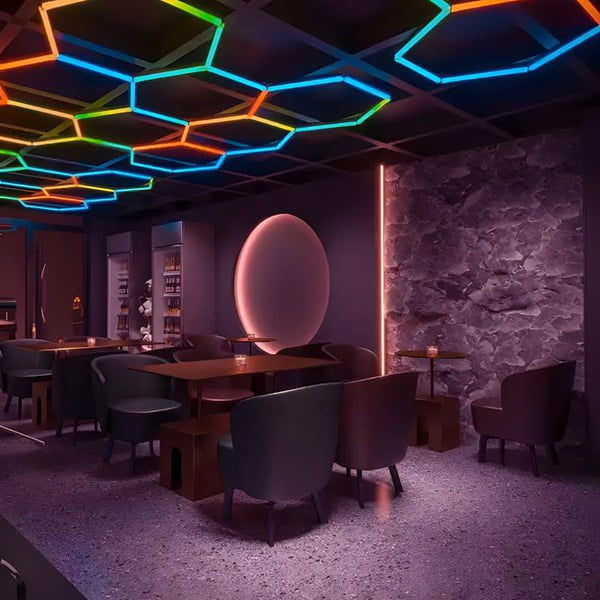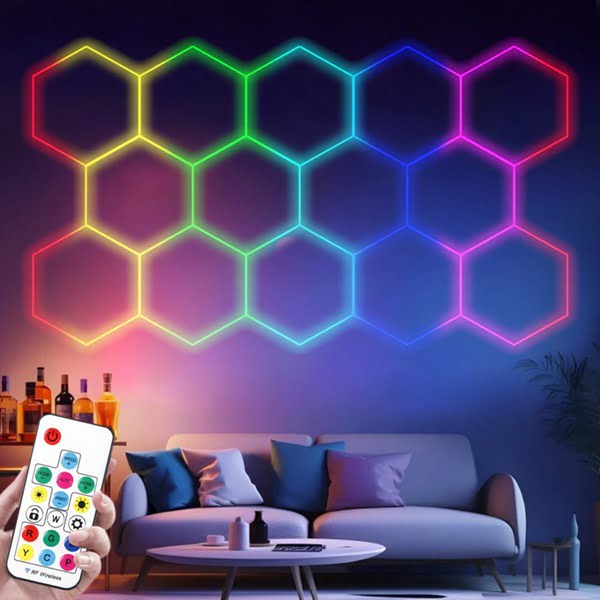RGB hexagon lights, characterized by their hexagonal shape and color-changing capabilities using Red, Green, and Blue (RGB) technology, are revolutionizing modern lighting design. These innovative fixtures combine aesthetic appeal with functional efficiency, making them popular in residential and commercial spaces. Their modular nature allows for customizable configurations, enabling users to create unique visual effects. Integrated with smart technology, these lights offer remote control and programmable settings, contributing to their growing appeal. Despite some concerns about installation challenges and product quality, RGB hexagon lights are increasingly favored for their energy efficiency, versatility, and ability to enhance interior design.
Table of Contents
1. Introduction: The Rise of RGB Hexagon Light
2. The Evolution of Lighting Technology
– Early Innovations in Lighting
– The Advent of Fluorescent and LED Lighting
3. Design and Features of RGB Hexagon Lights
– Understanding Hexagonal Lighting
– The Power of Customization
– Integrating Smart Technology
4. Types of RGB Hexagon Lights
5. Installation and Usage
6. Benefits of RGB Hexagon Lights
7. Conclusion
Introduction
In the ever-evolving world of interior design and lighting technology, RGB hexagon lights have emerged as a prominent trend. Their distinctive hexagonal shape, combined with the ability to emit a wide spectrum of colors through RGB technology, makes them a versatile and dynamic lighting solution. These lights are not only functional but also serve as a statement piece in various settings, from cozy living rooms to trendy commercial spaces. As the demand for customizable and energy-efficient lighting continues to grow, RGB hexagon lights stand out as a preferred choice for those looking to enhance their environments with both style and functionality.
The Evolution of Lighting Technology
Early Innovations in Lighting
The journey towards modern lighting solutions like RGB hexagon lights began with the invention of the incandescent light bulb in the late 19th century. Pioneers such as Sir Hiram Maxim, Sir H. Joseph Swan, and Thomas Edison laid the groundwork for electric illumination, although these early bulbs were highly inefficient. Incandescent bulbs converted only about 5% of their energy into visible light, with the rest dissipated as heat, leading to the search for more energy-efficient lighting options.
The Advent of Fluorescent and LED Lighting
The development of fluorescent lighting marked a significant improvement in energy efficiency, producing more light per watt than incandescent bulbs. However, it was the introduction of LED (Light Emitting Diode) technology in the late 20th century that truly revolutionized the lighting industry. RGB LED lights, incorporating red, green, and blue diodes, allowed for the creation of a vast spectrum of colors while consuming up to 80% less energy than traditional bulbs. This innovation set the stage for the emergence of RGB hexagon lights as a modern lighting trend, blending technological advancements with contemporary design aesthetics.
The Rise of RGB Hexagon Lights
As consumers increasingly sought customizable and innovative lighting solutions, RGB hexagon lights gained popularity. These fixtures combine the flexibility of RGB technology with a geometric design, allowing users to create personalized lighting arrangements that cater to their aesthetic preferences. The modular nature of these lights enables a variety of configurations, making them suitable for a wide range of applications in both residential and commercial settings.
Design and Features of RGB Hexagon Lights
Understanding Hexagonal Lighting
Hexagonal lighting, with its honeycomb-like structure, offers a unique blend of modernity and elegance. These fixtures are often crafted from materials such as metal and plastic, creating dynamic patterns of light and shadow that enhance the overall ambiance of a room. Whether mounted on walls or suspended from ceilings, hexagonal lights serve as both functional luminaires and striking design elements.
The Power of Customization
Customization is a key feature of hexagonal lighting, allowing individuals to express their unique style and personality. The modular design of these lights enables users to experiment with different configurations, colors, and layouts. By aligning the design with the surrounding décor and thematic elements, such as minimalist or industrial motifs, users can create a cohesive visual continuity that elevates the ambiance of their spaces.
Integrating Smart Technology
The integration of smart technology further enhances the versatility of hexagonal lighting. Features such as remote control, brightness adjustments, and programmable lighting sequences allow users to tailor their lighting experience to their specific needs. This not only increases convenience but also adds a layer of sophistication to modern living environments.
Types of RGB Hexagon Lights
Standard RGB Hexagon Lights
Standard RGB hexagon lights offer a basic configuration that allows users to arrange the panels in various patterns. Utilizing RGB technology, these lights can produce a full spectrum of colors, making them suitable for a wide range of environments, from home décor to themed events.
Advanced RGB Hexagon Systems
Advanced RGB hexagon systems come with additional features such as smart connectivity and app control. These systems allow users to program lighting sequences, create dynamic color changes, and integrate the lights with home automation systems, providing extensive possibilities for creative lighting arrangements.
Specialty and Customizable RGB Hexagon Lights
For those with specific aesthetic or functional needs, specialty RGB hexagon lights are designed for professional settings like entertainment stages, gyms, and commercial spaces. Additionally, DIY kits offer a hands-on approach to customization, enabling users to create personalized lighting setups that reflect their individual style.
Installation and Usage of RGB Hexagon Lights
DIY Installation Steps
For those opting for a DIY approach, installing RGB hexagon lights can be a rewarding project. Begin by planning the lighting design, gathering the necessary tools and materials, and measuring and preparing the installation site. Follow the installation instructions carefully, fine-tuning the lighting effects using the RGB controller, and securing the components to ensure a stable and visually pleasing result.
Professional Installation
For individuals who prefer a hassle-free experience or are unsure about the technical aspects of installation, hiring professionals can ensure a safe and reliable setup. Professionals can handle everything from planning to execution, allowing you to focus on enjoying the final result.
Applications in Various Settings
RGB hexagon lights are versatile enough to be used in a variety of settings. In home décor, they can create ambient mood lighting that complements different rooms’ aesthetics. In event settings, these lights can enhance the atmosphere by matching the lighting with specific themes. Outdoors, RGB hexagon lights can transform patios, gardens, and walkways into vibrant and inviting spaces.


Benefits of RGB Hexagon Lights
Energy Efficiency
One of the primary advantages of RGB hexagon lights is their energy efficiency. Compared to traditional lighting options, RGB LEDs consume significantly less power, reducing electricity bills and contributing to a more sustainable future. Their longevity also means fewer replacements, resulting in less waste and a smaller environmental footprint.
Versatility and Customization
The geometric form and customizable features of RGB hexagon lights make them a versatile choice for various design themes. Whether used as subtle accent lighting or as a bold statement piece, these lights can be tailored to suit the aesthetic preferences of any space, enhancing the overall ambiance.
Mood Enhancement and Productivity
Adjustable color settings allow for the creation of specific atmospheres that can positively impact mood and productivity. Research indicates that controlling light color and intensity can help regulate circadian rhythms, promoting healthier living environments.
Conclusion
RGB hexagon lights have become a staple in modern lighting design, offering a perfect blend of aesthetic appeal, functional efficiency, and energy savings. Their modular nature and integration with smart technology make them a versatile choice for both residential and commercial spaces. While some challenges remain, particularly in terms of installation and product quality, the benefits of RGB hexagon lights far outweigh these concerns. As the trend towards customizable and sustainable lighting continues to grow, RGB hexagon lights are poised to remain a popular choice for enhancing interior design and personal expression.

Leave A Comment